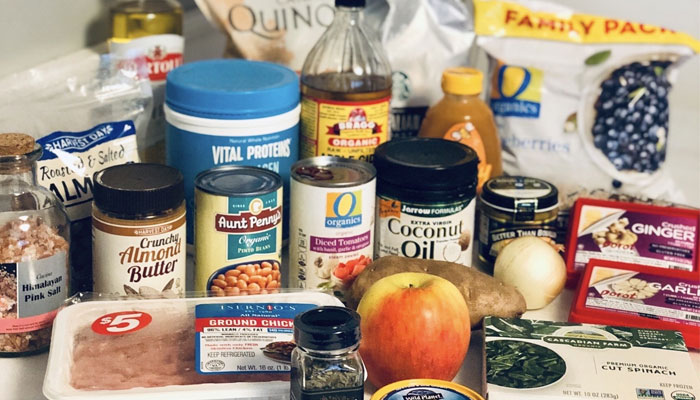
Discover the top essential foods for long-term storage to ensure you have access to nutritious and tasty options during an emergency. From grains to canned goods, learn how to stock your pantry with foods that have a long shelf life and provide the sustenance you need.
Many families are looking to build a food storage pantry. It’s important to have long-lasting foods and that can be Foods easily prepared.
Whether you live in an area that could be affected by severe weather or a natural disaster, it is wise to store food that will last for long periods. Here are the top essential foods for long-term storage:
Rice
Rice is an excellent staple to store because it has a long shelf life. It is also inexpensive and simple to prepare. It is a good source of energy, carbohydrates, and minerals. It has a much longer shelf life than other foods, like flour or oats, which can go rancid quickly.
Mylar bags are a great option for storing rice because they protect it from moisture, oxygen, and pests. They are light-proof and can be sealed with a heat sealer. You can even add an oxygen absorber to the bag before sealing it to remove any excess oxygen and keep the food fresh for a longer time. Food-grade buckets are a great way to store your rice because they are leak-proof and can be stacked to save space. You can label each bucket with the type of rice and the date it was stored.
Valley Food Storage offers top-quality, long-term food storage options at affordable prices. By using Valley Food Storage Promotional Codes, you can save even more on their already competitive prices. With a variety of options to choose from, including freeze-dried meals and emergency food supply kits, Valley Food Storage is the perfect choice for those who want to prepare for any situation without breaking the bank. Don’t miss out on the chance to save money and ensure your family’s safety with Valley Food Storage.
While many people focus on storing canned meats, fruits and vegetables, and protein bars in their preparation for a disaster, you should never underestimate the value of stocking up on rice. It is one of the most versatile, inexpensive, and nutritional foods available. It is a must-have in any prepper’s pantry.
Oatmeal
Oats are a nutrient-rich food that can last for months if stored properly. They can be used to make quick and easy breakfasts, and they can also be cooked into a variety of other meals. For best results, oats should be stored in an airtight container to prevent condensation and maintain their texture. They should also be labeled and dated so that you know when they are ready to use.
Uncooked oats can be stored in the refrigerator for a convenient and healthy breakfast option. To use, simply mix the oats with a liquid of your choice and stir. Then, top with your favorite toppings for a tasty and nutritious meal. Cooked oats can also be stored in the fridge for an easy and delicious morning snack.
Another great way to use oats is to make wholesome oat bread or baked goods. These are fun and nutritious treat that the whole family will love. You can even replace some of the flour in your favorite cookie recipe with oat flour to give them a deliciously unique flavor.
Oatmeal can be stored in an airtight, dark, dry place such as a pantry or root cellar. They can be stored for up to a year, but it’s important to rotate them periodically.
Beans
Beans are a great source of protein. They’re also high in iron, potassium, and folate. They’re food preppers that can use as an important alternative to meat in a survival situation. But, like any other food, beans need to be stored properly. According to registered dietitian Rachel Paul, beans can last up to 25 years or more if they’re prepared and stored correctly.
The key to storing beans is to keep them out of the light, heat, air, and moisture. This will protect them from bugs, rodents, and spoiling. Beans are also versatile and can be used in a variety of dishes.
Beans, which are legumes, are the seeds of certain plants in the Fabaceae family. They are one of the best plant-based sources of dietary protein, making them an excellent choice for vegetarians and vegans.
When preparing for a survival situation, it’s essential to have an emergency food storage plan in place. This will help ensure you’re able to survive without access to groceries in case of a disaster or other emergency. Having long-term storage foods on hand will give you peace of mind and help you be better prepared for anything.
If you’re looking to save money on freeze-dried vegetables, emergency food, and long-term food, be sure to check out the Food & Drinks Discount Code! With their wide selection of promo codes and coupons, you’re sure to find a great deal on the items you need to stock up on. Whether you’re preparing for an emergency or simply looking to save money on your grocery bill, the Food & Drinks Discount Code has got you covered. So why wait? Head on over to their website today and start saving!
Vegetables
Vegetables are an important part of a healthy diet and can help ensure that the body gets essential vitamins and minerals. They are also low in calories and fat in general. They can be eaten raw or cooked and are an excellent source of dietary fiber, which helps keep the digestive system working properly.
Vegetable storage is an important part of any emergency food supply. They can be frozen, canned, or dehydrated to make them last longer. When storing vegetables, it is best to choose those that are high in nutritional value and that will keep you well. Cucumbers are a popular choice for pickling because they have a long shelf life and provide a good source of nutrients.
The term “vegetable” refers to the edible portion of an herbaceous plant, which is typically grouped into categories according to their leaves (lettuce), stems (celery), roots (carrot), tubers (potato), bulbs (onion) and flowers (broccoli). However, botanically, some plants are fruits, but they are commonly considered vegetables in the culinary sense such as tomatoes. Other foods that are commonly considered vegetables include squash, eggplant, and seeds such as peas. All of these are good choices for long-term storage.
Meat
A good supply of meat is a must in any survival food storage. It provides a quick, simple source of protein and energy to keep the body going in a crisis.
If you are purchasing canned meats for storage, choose the higher-quality brands. Look for foods that are low in sodium and high in nutrients. Also, opt for those that are pasteurized or otherwise treated for long-term storage.
Another important source of protein is dairy. A great choice is dry milk, which has a shelf life of up to 24 months and is easy to store in an airtight container. It can be used to make cheese or added to soups and other recipes.
Another dairy item to consider is natural, unprocessed honey. It is a healthy sugar substitute and can be used as medicine or to sweeten foods in a survival situation. Also, it is a natural preservative that can keep food from spoiling. Opt for dark molasses rather than light if you are storing it, as it has more vitamins and minerals in it. It also contains sulfur dioxide, which helps prevent spoilage. If storing for the long term, be sure to purchase food-grade buckets with gamma lids to protect the contents from animals and bugs.
Bread
Bread is a staple of the human diet and provides vital nutrients. It is a great source of carbohydrates and has many other uses in survival situations. Many different recipes for homemade bread can be found online and can be made to suit any dietary needs.
Flour is another basic food that has a long shelf life and can be stored in large quantities. All-purpose flour has a shelf life of about 12 months and can be used to make almost anything. Whole wheat, bran, and rye flour have shorter shelf lives but can be ground with a wheat grinder for emergency use.
Salt, sugar, and honey are other important items to have in a survival situation. These foods are also good for prepping because they have a long shelf life and can be easily stored in containers such as glass jars or plastic buckets. Salt, sugar, and honey can last up to 20 years in a cool, dark place.
Beans are another top essential food for long-term storage. They provide a great source of protein, fiber, and other vitamins and minerals. A #10 can of beans has enough protein to sustain one adult for a year.
Pasta
A staple for many, pasta is a light and healthy source of carbohydrates. It also contains protein, which can help boost your energy during survival times. It is a great choice to add to your survival food stockpile, along with nuts (walnuts, pistachios, peanuts, hazelnuts, almonds, pine nuts) which are high in protein and fiber.
Pasta is made from a flour dough that is either dried or fresh. Dried pasta is very versatile and can be stored in a cool, dry place for years. Dried pasta is typically made from durum wheat semolina, which has a higher protein content than the soft wheat used in bread. Dried pasta is available in hundreds of shapes, including spaghetti, angel hair, fettuccine, capellini, fusilli, penne, rotini, and rigatoni. Some types of pasta, such as calamari, chitarra, fagioli, risotto, and shells, are stuffed with meats, cheeses, spinach, or other ingredients.
Long-term storage is your emergency stash of non-perishable foods that will keep you alive and nourished during a disaster. It is comprised of basic dry staples that can last for up to 30 years. Read more about short-term and long-term storage in our post, How to Build Your Food Storage Plan.
Conclusion
Having a stockpile of essential foods for long-term storage is a smart way to prepare for unexpected emergencies. By including items that are high in calories, protein, and nutrients, such as grains, beans, canned fruits and vegetables, and dried meats, you can ensure that you and your family will have access to healthy and nourishing meals during difficult times. Don’t forget to rotate your supplies and store them in a cool, dry place to extend their shelf life.








